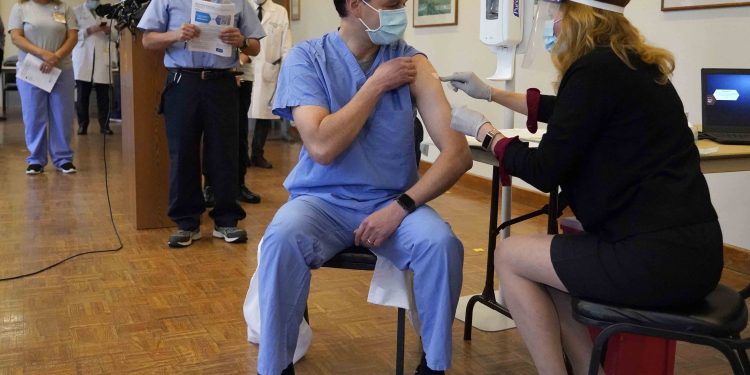London: The UK’s National Health Service Saturday said that it has teamed up with law enforcement and security agencies to warn the public not to fall victim to con artists trying to exploit the coronavirus vaccine campaign.
England’s senior doctors have joined hands with Action Fraud and the National Crime Agency (NCA) to issue joint advice reminding people that vaccines are only available for free at the NHS, and health service staff will never ask for payment to get it.
It comes as a 33-year-old man was charged by the City of London police with five offences including common assault and fraud over the fake administration of a “COVID-19 vaccine” after he conned an elderly woman.
“We know how excited people are to get the vaccine when it’s their turn to do so, but sadly we’re seeing that excitement is also bringing out the cheats, crooks and conmen looking to make a fast buck,” said Dr Nikki Kanani, general practitioner (GP) and NHS medical director for primary care.
“Remember, the vaccine will always be free on the NHS. Our staff will never ask for, or accept, cash for vaccines, never ask for your banking details or identity documents, and will never come around to your house unannounced,” she said.
The warning comes as temples and mosques in the country launched a drive to combat fake news around the two vaccines currently being administered in the UK – the Pfizer/BioNTech and Oxford/AstraZeneca jabs.
“We have encouraged people to be aware and remain vigilant of any scams in relation to the vaccine, sharing the standard NHS advice from their websites,” said a spokesperson for Neasden Temple in London.
The warnings come amid a number of reports of criminals attempting, and in some cases succeeding, to steal cash or personal details from people keen to get the vaccine.
In one extreme case, a man in London knocked on the door of a 92-year-old woman and administered her with a fake vaccine before taking a 160 pounds payment, which he told her would be reimbursed by the NHS.
In other cases, people are reporting suspicious text messages with a link to a booking site which mimics an NHS page, but asks for personal details including bank account numbers.
Con artists have also been known to use telephone calls to extract payments or bank details which can then be sold to organised criminal gangs or used to order and pay for goods online.
“The vaccine is a crucial tool in fighting the coronavirus and keeping people safe. Thankfully, the number of reports into Action Fraud are relatively low but we have seen an increase in the last two months, particularly around scam text messages,” said Pauline Smith, Head of Action Fraud.
“Remember, the NHS will never ask for your bank account or card details. Anyone asking for payment for the vaccine is committing fraud,” she said.
As of January 10, Action Fraud, the UK’s national reporting centre for fraud and cyber crime, said it has received 65 reports in relation to the COVID-19 vaccine.
“The advice is very simple. The vaccine is only available on the NHS, and you will never be asked to pay for it or to provide your bank details. Anything that suggests otherwise is a fraud,” said Graeme Biggar, Director General of the National Economic Crime Centre at the NCA.
The NHS said that public polling has consistently shown a high level of enthusiasm for the COVID-19 vaccine, which is now being made available at over 1,000 sites across England.
“Vaccines are our way out of this pandemic. It is vital that we do not let a small number of unscrupulous fraudsters undermine the huge team effort underway across the country to protect millions of people from this terrible disease,” said UK Health Secretary Matt Hancock.
The vaccines are being rolled out free of cost by the NHS, with letters going out to eligible categories of those most at risk of death from coronavirus and frontline workers through the NHS, certain employers, GP surgeries or pharmacies.
The UK government has set a target to cover all the vulnerable groups by mid-February before further expanding the vaccination programme to other lower risk adults.
PTI






































